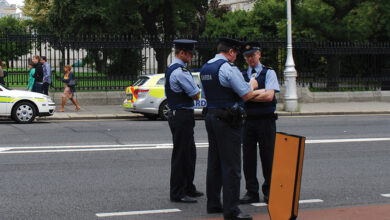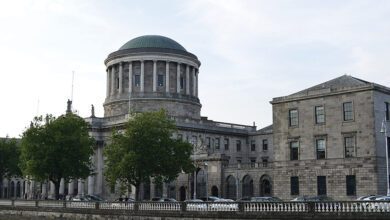 After 12 years as Director of Public Prosecutions, James Hamilton retired this month. Before leaving he talked to Stephen Dineen about changes to the criminal justice system.
After 12 years as Director of Public Prosecutions, James Hamilton retired this month. Before leaving he talked to Stephen Dineen about changes to the criminal justice system.
James Hamilton was only the second Director of Public Prosecutions (DPP) since the office was established in 1974. As the man responsible for bring criminal prosecutions to trial, he has seen significant changes to the DPP’s role and the criminal justice system.
Among these has been the nature of crime and the type of cases which have crossed his desk. “I know that there’s a general view that, for example, we don’t prosecute nearly enough white collar crime,” he tells eolas in his Merrion Street office, “but we actually prosecute a lot more than we did ten or twenty years ago.”
Examples of this from the political domain include Ray Burke (tax offence), Frank Dunlop (corruption), former Limerick TD Michael Collins (obtaining a tax clearance certificate under false pretences) and the initiation of proceedings against Charles Haughey (obstructing the work of a tribunal).
He has also seen the rise of cyber-crime, which is “completely new,” and child pornography. “Unfortunately most of the crime that we deal with in this country is drug-related,” he notes.
Linked to the drugs industry is the “phenomenon of gangland crime”. Hamilton believes at least half of Ireland’s murders are gangland related.
White collar crime
Though there has been an increase in the number of white collar crime prosecutions there is public frustration at the pace of current investigations into alleged malpractice among Ireland’s banks.
While An Garda Síochána and the Office of the Director of Corporate Enforcement are conducting the investigations, the Director has been “kept up to date” with some of the current ones. Though this is not normal practice (a file is generally sent to the DPP when an investigation is complete) it is different in this instance “given the nature of it” and because of how “wide-ranging” it is. “Good progress is being made” he says, and they are “approaching a stage where decisions can be made.”
Hamilton acknowledges that the public is frustrated, but believes that there is a lack of understanding out there. He states: “People always contrast us with the United States and they mention the Madoff case. I wonder is there any other that were done as quickly as it. I suspect not.”
One of the reasons why the United States is seen as a place with speedier justice, says Hamilton, is plea bargaining. “What it does essentially is: the prosecutor throws the book at somebody, charges them with offences, one of which if they’re convicted of it they might end up with one of these sentences they’d need to live five or six lifetimes to serve.” Then, “on the side”, someone is offered a deal whereby, if they plead guilty to some lesser offence, they’ll be out of jail after 18 months.
He reflects that “the general perception of the defence bar [in the United States] is that the whole plea bargaining system is very unjust.” He doesn’t believe many Irish lawyers would support the same system.
Another incorrect perception is that investigations are quicker abroad. In England and Wales “a major fraud investigation is likely to take five or six years.” There is also a notion, says Hamilton, that a significant amount of extra resources can be simply assigned. “Investigators need quite a lot of training, so you can’t just suddenly announce: ‘we’re going to suddenly hire another 200 investigators.’ Where are you going to get them from? It’s not as straight forward as that,” he explains.
What will help current investigations, however, are new laws under the 2011 Criminal Justice Act such as the criminal offence of not assisting gardaí in white collar crime investigations and the ability of gardaí to suspend detention at various intervals to allow them verify evidence or documentation. He says “one of the things that has stymied investigations up to now is that in some cases financial institutions were just not willing to co-operate.” The number of delays because various people who were not suspects did not cooperate was “surprising”.
One of the hallmarks of Hamilton’s tenure was the change in victims’ status.
“There used to be an attitude among prosecutors, a long time ago,” says Hamilton, “that the victim was just a witness and didn’t have any particular role and didn’t need to be told anything really.” It is now recognised that the victim “has a particular interest in the outcome of proceedings.” Hamilton continues: “criminal law is designed, not just to protect society as a whole, but also to protect the individual victim and to give that person some sort of satisfaction” and “recognition that a crime was committed.”
On 22 October 2008 he introduced a pilot scheme to provide families of victims of fatal crimes reasons for not prosecuting. Twenty-five families have availed of it. “It’s been reasonably successful in the sense that we haven’t encountered very many cases where we couldn’t give a reason,” he explains. “In fact, usually when we haven’t been able to give a reason it’s because proceedings are still ongoing.” The scheme has been time consuming but has been beneficial because it has made staff more careful; knowing that “everything they say is going to be scrutinised by somebody else and that they’ll have to justify it.”
The rights of those not charged or convicted have to be protected too. A balance in how general the reason should be is needed. “Of course if the reason is too general then it’s hardly a reason at all,” he adds.
The DPP’s office plans to extend the scheme. He anticipates the next crimes to be included are rape and sexual assaults but more preparatory work is needed. Hamilton’s office also offers consultation with victims before a trial so they will understand procedures, a right he says people are not always aware of. If the prosecution is considering accepting a plea in a murder charge it informs the family and the reasons for doing so.
In parallel, an EU Directive on the rights of victims (COD/2011/0129) has been drafted.
Reforms
Despite the improved status of victims in the criminal justice system, many are still frustrated with delays. The 2009 Hanley report, ‘Rape and Justice in Ireland’, found that “a very high number of the cases are not prosecuted at the end of the day because the victim no longer wishes to go on with it,” according to Hamilton.
Among the reforms he believes are necessary, are:
• adequate resourcing of the courts: “Ireland still has one of the smallest judiciaries per head of population to be found anywhere in the world”;
• reform of pre-trial procedures, including pre-trial hearings by a judge without a jury;
• better case management such as orders for costs reflecting whether or not a cheap or simple remedy was attempted before judicial review;
• the power for judicial orders to be amended before a judicial review is heard;
• having sufficient length taken off a sentence for an early plea; and
• reform of contempt of court laws so they apply where a charge is imminent rather than at the moment of charge (the current laws can endanger someone’s right to a fair, non-prejudiced trial).
“Unfortunately our legal profession isn’t good at radical re-thinks,” says Hamilton, who was a barrister for eight years, “because I think they tend to be very bound by precedent.”
Hamilton says his office has significantly reduced costs through “early intervention” with the other side where judicial review arises.
A relatively unknown power which Hamilton needed to be mindful of in his last week as Director is the DPP referendum petition powers. The DPP’s can bring a petition to the High Court within seven days of a referendum result, challenging its validity on the grounds of impropriety or irregularity in the manner in which the referendum was held. He has similar powers for a Dáil election. While he is not aware of the power having ever been used, the DPP must be a notice party in similar cases brought by citizens.
Such a power does not sit easy with Hamilton. The situation might arise where his office would “have to adopt a position on something when maybe there wouldn’t have been a proper investigation.” The adopted position could potentially prejudice “a possible future criminal prosecution.”
The Ombudsman or an independent electoral commission should have this responsibility. In the 2001-2003 DPP strategy statement he criticised this provision but there has been no reform. “It’s not a problem until something happens, and then people say: ‘Why didn’t you think of that?’” he concludes.
Society and criminal justice
After 37 years working in the legal system does he feel society has struck the right balance in addressing the causes of crime and how we punish crime?
“I think our courts have a rather more civilised attitude than courts in the United States, where the approach is lock ‘em up and throw away the key,” but says Ireland’s prison population has been increasing “very rapidly”, partly explained by having “a very large number of people in prison because they acted as drug couriers.” Hamilton adds: “I don’t know what the solution is, but [minimum 10 year sentences for certain drug offences] doesn’t seem to be having a huge deterrent effect.”
The increase in crime is partly an “urban phenomenon”. There is a “class of alienated people in the poorer urban areas” who don’t get much of a chance in life “because they are born to circumstances where they’re not well looked after.” There is also the link between areas with the highest crime levels and the lowest education levels, with many deprived people “not having any goals in life”.
Hamilton says that social workers he’s talked to say they can predict which three or four year old children will end up in the criminal courts in 12-13 years time. “You can see that people are in a situation where they’re at risk, and there isn’t early enough intervention to deal with it.”
Profile
From Dublin, James Hamilton studied history and political science in Trinity College. He was then called to the Bar and practised on the Northern and Dublin Circuits from 1973-1981. During this time he was prosecuting counsel for County Donegal (1977-1981).
In 1981 he was appointed a full-time legal adviser to the Attorney General, and in 1995 made permanent head of the Office of the Attorney General and senior legal adviser to the AG. Hamilton was appointed DPP in 1999 and retired in November 2011.
He is a member of the Council of Europe’s Venice Commission, on which he will represent the State for another two and a half years. He also has two more years serving as President of the International Association of Prosecutors.
In his spare time he likes reading, gardening, travelling and walking.






